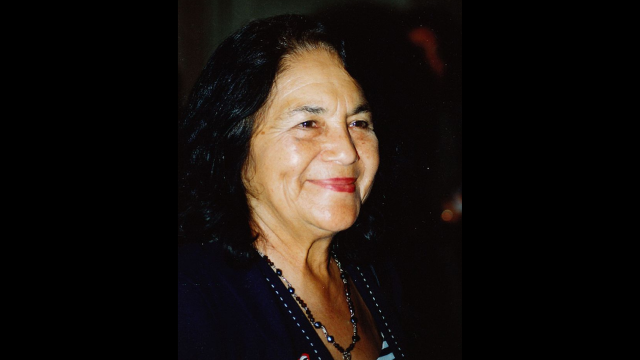10
Apr
In Honor of a Living Legend, LA County Declares April 10 as Dolores Huerta Day

(Beyond Pesticides, April 10, 2025) The Los Angeles Board of Supervisors has voted to declare today, April 10, Dolores Huerta Day, honoring the lifelong efforts of social justice activist Dolores Clara Fernández Huerta on the celebration of her 95th birthday. In the words of Chair Pro Tem Hilda L. Solis, according to Colorado Boulevard, “Dolores Huerta’s contributions to Los Angeles County and to Latinos across the country have inspired generations of leaders fighting for justice for all. Now more than ever, we honor Dolores Huerta for her work as one of the most influential labor activists of our time… may her legacy continue to light a fire in us all.”
Ms. Huerta, in accepting the recognition, noted, “I accept this on behalf of Los Angeles’ working people, especially our immigrant community, whose labor supports families and children. The Supervisors have gone above and beyond to assist immigrants, and as we face challenges ahead, it’s vital to continue supporting their bold, compassionate leadership for our most underserved communities.”
This action follows prior recognition from then Acting Governor of California Eleni Kounalakis in 2024 and the state of Washington in recognizing Ms. Huerta’s decades of leadership. It comes in the wake of the Trump administration’s attacks on farmworkers and others fighting for farmworker justice. [As Beyond Pesticides covered in a recent Daily News post, on March 12, 2025, the U.S. Environmental Protection Agency (EPA) Administrator Lee Zeldin announced the agency would be shutting down the Environmental Justice and Diversity, Equity, and Inclusion (DEI) offices and staff at ten of the regional offices and the Washington D.C. headquarters, allegedly in response to the president’s executive order, “Ending Radical and Wasteful Government DEI Programs and Preferencing.”]
A Lifetime Legacy from a Legendary Activist
A schoolteacher-turned-activist and daughter of a farmworker, Ms. Huerta was inspired to action by hungry farm children in her classroom, organizing farmers and farmworkers before cofounding the Stockton chapter of the Community Service Organization (CSO) and the Agricultural Workers Association. After meeting activist César Chávez, the team founded the National Farm Workers Association (NFWA) in 1962—the precursor of the United Farm Workers’ Union (UFW)—ultimately resulting in the passage of the California Agricultural Labor Relations Act, which “protects the rights of agricultural employees to make their own decisions about whether or not they want a union to negotiate with their employer about their wages, hours, and other working conditions.”
As lead organizer for the historic Delano grape boycott of 1965, for example, she convinced more than 17 million consumers to stop buying grapes in support of workers’ demands for collective bargaining rights, despite interference by the U.S. government in purchasing grapes to send to U.S. soldiers in Vietnam. Nonetheless, the campaign succeeded, and Ms. Huerta led the negotiations that followed to secure collective bargaining agreements between the California grape industry and UFW.
A recipient of the Eleanor Roosevelt Human Rights Award and the Presidential Medal of Freedom, Ms. Huerta remains a champion of equity and environmental justice, despite the ethnic and gender bias she faced throughout her career. Author and organizer Randy Shaw, in the 2017 documentary, Dolores, credits Ms. Huerta and her collaborators for helping to lay the groundwork for the concept of “Environmental Justice”: “The Environmental Justice movement said that certain environmental hazards are disproportionately impacting on people of color,” Mr. Shaw highlights, continuing that, “It wasn’t simply stopping DDT, but it was also making the larger point, you’re only allowing this because of who the workers are, and their race and class background.”
In an interview with Civil Eats, Ms. Huerta described her theory of change—embodied in the mission of the Dolores Huerta Foundation that she founded in 2002—as building “leadership in low-income communities and organize people so that they can have a sense of their own voices and their own power… once they understand this process and they have the power to change policy—and politicians—they really feel empowered and they want to go on and keep organizing. It’s wonderful. I call it ‘magic dust.’”
Dolores Huerta has been spreading this “magic dust” for over seven decades.
****
The fight for pesticide regulation is inextricably linked to the fight for immigrant rights. Beyond Pesticides will continue to speak out and monitor progress on inequities related to pesticides, agriculture, farmworker well-being, and the health of BIPOC communities in the U.S. For current reporting on matters related to environmental justice, please see Beyond Pesticides’ Daily News archives on Environmental Justice.
In support of farmworkers and the families of these essential workers behind bringing our food from farm to table, Beyond Pesticides advocates a precautionary approach, transitioning away from the use of petrochemical pesticides and synthetic fertilizers in land management and agriculture by transitioning to organic as part of a holistic system.
Furthermore, given the wide availability of non-pesticidal alternative strategies, families, chemical occupational workers, and the agricultural sector can apply these methods to promote a safe and healthy environment. For more information on the benefits of organic for both consumers and farm workers, see Beyond Pesticides’ webpage, Health Benefits of Organic Agriculture.
All unattributed positions and opinions in this piece are those of Beyond Pesticides.
Image credit: John Mathew Smith & www.celebrity-photos.com from Laurel Maryland, USA, CC BY-SA 2.0, via Wikimedia Commons.
Sources: Colorado Boulevard, The Cascadia Advocate, Civil Eats, NPR, Newsroom, Dolores Huerta Foundation, People For the American Way, Dolores (2017 film); Beyond Pesticides Daily News [Washington and California to Celebrate First Annual Dolores Huerta Day on April 10;“Sí, se puede”—Letter and Reflection From the Women of Beyond Pesticides]
Michals, E. by D. (n.d.). Biography: Dolores Huerta. Dolores Huerta Biography. https://www.womenshistory.org/education-resources/biographies/dolores-huerta










